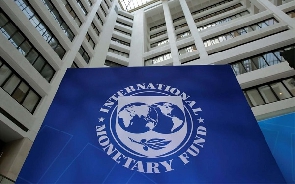 The International Monetary Fund
The International Monetary Fund
The International Monetary Fund is predicting a rather difficult time ahead for the banking sector in developing countries such as Ghana in 2023. According to Fund’s Global Financial Stability Report, some economies are likely to face recession if stringent measures are not adopted to address global fiscal conditions. The report noted that the development will increase financial stability risks with balance of risks predicted to tilt toward the downside. It further pointed out that despite the global banking sector being able to withstand certain pressures for a period, a global bank test undertaken by the IMF shows that the reserve buffers of some banks may not be enough heading into 2023. The IMF report explained this can be attributed to an abrupt and sharp tightening of global financial conditions which may force several economies into recession coupled with soaring inflationary pressures which could significantly impact capital requirements. Meanwhile, in Ghana, the central bank has embarked on a number of policy rate hikes to deal with inflationary pressures which has been soaring in months. The Bank of Ghana, BoG, on October 7, 2022 hiked the policy rate by 250 basis points from 22 percent to 24.5 percent - a move that is likely to impact the cost of lending. The country in September also recorded an inflation rate of 37.2 percent, making it the highest in about 20 years. Ghana has since July 2022 engaged the IMF for economic support programme to address the current economic challenges which have impacted the performance of the local currency, rising inflation figures and among others. But the Government had occasionally blamed the situation on the fallouts from the COVID-19 pandemic and the Russia-Ukraine war. However, Ghana is said to be targeting $3 billion from the IMF once an agreement can be reached. MA/SARA Watch the latest episode of BizTech below:
The International Monetary Fund is predicting a rather difficult time ahead for the banking sector in developing countries such as Ghana in 2023. According to Fund’s Global Financial Stability Report, some economies are likely to face recession if stringent measures are not adopted to address global fiscal conditions. The report noted that the development will increase financial stability risks with balance of risks predicted to tilt toward the downside. It further pointed out that despite the global banking sector being able to withstand certain pressures for a period, a global bank test undertaken by the IMF shows that the reserve buffers of some banks may not be enough heading into 2023. The IMF report explained this can be attributed to an abrupt and sharp tightening of global financial conditions which may force several economies into recession coupled with soaring inflationary pressures which could significantly impact capital requirements. Meanwhile, in Ghana, the central bank has embarked on a number of policy rate hikes to deal with inflationary pressures which has been soaring in months. The Bank of Ghana, BoG, on October 7, 2022 hiked the policy rate by 250 basis points from 22 percent to 24.5 percent - a move that is likely to impact the cost of lending. The country in September also recorded an inflation rate of 37.2 percent, making it the highest in about 20 years. Ghana has since July 2022 engaged the IMF for economic support programme to address the current economic challenges which have impacted the performance of the local currency, rising inflation figures and among others. But the Government had occasionally blamed the situation on the fallouts from the COVID-19 pandemic and the Russia-Ukraine war. However, Ghana is said to be targeting $3 billion from the IMF once an agreement can be reached. MA/SARA Watch the latest episode of BizTech below: